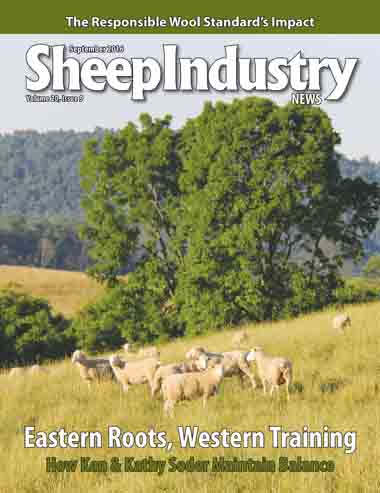
- September 2016
- President’s Notes
- Should Your Wool Be RWS Certified?
- Patagonia Buys American in Wool Restart
- Reporting Rules Show Little Change
- Eastern Roots, Western Training
- Genetic Data Pays Off at Sale Barn
- UK Ovine Genetics Available Again in U.S.
- Polypay Takes on Parasite Study
- Comments Submitted on Uruguay Proposal
- Obituaries
- Market Report
- The Last Word
U.K. Ovine Genetics Available Again in U.S.
JOHN WILKES
Special to the Sheep Industry News
A six-year ban has been lifted allowing trade of United Kingdom ovine genetics to the United States. American breeders can now import sheep semen from a range of British breeds.
Lifting the ban was an arduous process. The Animal Plant Health Inspection Service, a division of the U.S. Department of Agriculture, and the U.K. Department of the Environment for Rural Affairs worked to develop the protocol for the May 2016 agreement.
This legislation encourages relationship building between American and U.K. sheep breeders, ovine genetic companies, American distributors and artificial insemination specialists.
ASI Executive Director Peter Orwick welcomed news of the end to restrictions, “The ASI office regularly hears from sheep producers interested in securing more genetics, so this announcement ought to generate interest among U.S. sheep breeders.”
Phil Stocker, Chief Executive of the National Sheep Association U.K. echoed his American counterpart, “The approval of certification for U.K. sheep semen to access the U.S. market is a very welcome step that the NSA fully supports. It will enable U.S. sheep farmers to access much needed genetic material for the good of their sheep population.”
The NSA will connect U.S. sheep breeders with U.K. breed societies and other relevant contacts through its website at Nationalsheep.org.uk.
U.S. heritage breeds of sheep that hail from the U.K. are on The Livestock Conservancy endangered list. Executive Director Alison Martin, Ph.D., is cheered by the import possibilities: “We are excited about this collaborative effort between the U.K. and U.S. breeders and hope it will increase the gene pool for both traditional and rare breeds of sheep of British origin here in the U.S.”
Brian Larson, past President of the National Lincoln Sheep Breeders Association is supportive of U.K. semen import for U.S. Lincoln Longwools.
“The Heritage breeds generally suffer for the lack of genetic diversity,” he said. “We know they hold great genetic treasures for the future of the U.S. sheep industry if we can keep the breeds viable.”
Significant developments have taken place since the May 2016 APHIS decision to renew U.K. semen export to the U.S. On July 18, APHIS invited comments on its recommendation to remove restrictions on ‘the importation of sheep and goats and their products’ from countries affected by Transmissible Spongiform Encephalopathies. This could mean an end to the 27-year embargo on live sheep and sheep embryos from the U.K. The trigger for the 1989 ban was the U.K. BSE cattle crisis. The U.S. government took immediate action to impose import restrictions.
The change in direction by APHIS follows recognition that they are out of step with current wider global scientific thinking about TSEs. Health protection of the U.S. national sheep flock can be maintained while permitting U.S. sheep breeders access to vital fresh U.K. genetics.
For further general information on U.K. sheep genetics in the U.S. email ovinegenes@gmail.com or call 301-637-9692.

